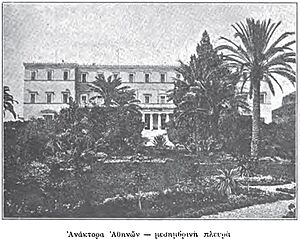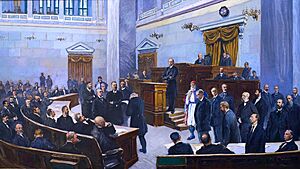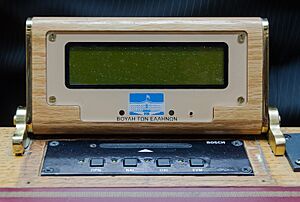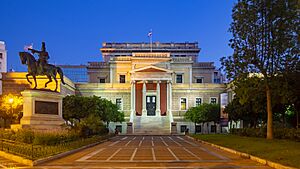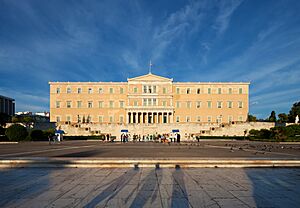Hellenic Parliament facts for kids
The Parliament of the Hellenes (called Voulí ton Ellínon in Greek), also known as the Hellenic Parliament, is the main law-making body of Greece. It is a single-chamber parliament, meaning it has only one group of elected representatives. This important building is located in the Old Royal Palace in Athens, right next to Syntagma Square. The Parliament is where citizens' voices are heard through the people they elect to represent them.
The Parliament has 300 members, called Members of Parliament (MPs). These MPs are chosen by the people in elections that happen every four years. For a time in history, between 1844–1863 and 1927–1935, Greece had a two-chamber parliament. This meant there was an upper house (called the Senate) and a lower house (the Chamber of Deputies). Many important Greek leaders have served as the Speaker of the Hellenic Parliament.
Contents
- How Greece's Parliament Developed Over Time
- Who Are the Members of Parliament?
- When Parliament Meets
- How Parliament is Organized
- How Laws Are Made
- Checking on the Government
- Parliament's Special Groups (Committees)
- Special Ways to Make Decisions
- Other Activities of Parliament
- Where Parliament Meets
- See also
How Greece's Parliament Developed Over Time
Early Days: Monarchy and Constitutions (1843–1909)
Greece's first national parliament started in 1843. This happened after a revolution forced King Otto to agree to a constitution. This first constitution created a system where the king still had a lot of power. He shared law-making duties with elected representatives and a group of appointed senators.
Later, in 1862, people were unhappy with King Otto. They rebelled and he was removed from power. A new king, George I, took over. The constitution of 1864 changed things a lot. It created a single-chamber parliament, meaning only one group of elected members. These members were elected for four years. This new constitution also brought back the idea that the people should have the main power.
A New Republic and Voting Rights (1927–1967)
In 1927, Greece became a republic, which means the country was led by an elected president, not a king. The constitution of 1927 set up a "President of the Republic." This president was chosen by the parliament and Senate for a five-year term. This president did not have law-making powers. This constitution also recognized the importance of political parties.
After World War II, the parliament continued to grow. The constitution of 1952 was very important because it gave women the right to vote. It also allowed women to run for election as Members of Parliament for the first time.
Modern Changes to the Constitution (1986, 2001, 2008)
Greece's current constitution has been updated several times.
- In 1986, the powers of the president were made much smaller.
- In 2001, many articles were changed. New rights were added, like protecting personal information. Rules for how political parties get money and how media owners relate to the government also became clearer. This update also made parliament work better and improved local government.
- The most recent update was in 2008. This update made changes to help areas like islands and mountains grow. It also gave parliament more power to check the government's budget.
Who Are the Members of Parliament?
How Many Members and How They Are Chosen
The Greek Parliament currently has 297 members. The constitution says there must be between 200 and 300 members. Since 1952, the number has been set at 300. Members of Parliament (MPs) are elected for a four-year term. They are chosen through a special voting system that combines different ways of counting votes. This system helps ensure that smaller parties also get a chance to be represented.
How Elections Work
Out of the 300 seats, 250 are chosen based on how many votes each party gets. Voters pick their favorite candidate from a party list. If the party with the most votes gets at least 25% of all votes, they get extra seats. This "bonus" can be up to 50 extra seats if they get 40% or more of the votes. After these bonus seats are given, the remaining seats are divided fairly among the parties. This system has been used since the June 2023 Greek parliamentary election.
To become an MP, a Greek citizen must be 25 years old or older on election day. They must also be able to vote. Most government workers, including those in the military, cannot run for parliament unless they quit their jobs first. University professors are an exception.
Groups in Parliament
Once elected, MPs form groups, usually based on their political party. A parliamentary group needs at least ten MPs from the same party. If a party ran in most areas and got at least 3% of the votes, five MPs can form a group. The leader of a party usually leads its parliamentary group. These groups have their own offices and staff to help them. The leader of the second-largest group is called the "Leader of the Opposition." This person has special rights, like getting more time to speak in parliament.
Protecting MPs While They Work
Members of Parliament have special protection while they are in office. This means they cannot be arrested or charged with crimes, unless they are caught in the act. They also don't have to share information about their work as lawmakers. However, parliament can vote to remove this protection if there's a serious crime. If a government minister is accused of a crime, a special parliamentary committee investigates it. If there's enough evidence, a special court is set up.
When Parliament Meets
The full group of 300 MPs is called the plenum. They meet after general elections, which happen every four years. The plenum must meet within 30 days of an election. Regular meetings start in October each year and last for at least five months. The time between two elections is called a parliamentary term. Greece is currently in its 18th parliamentary term since 1975.
The President of Greece can call extra meetings if needed. Parliament also has special meetings for important duties. These include electing the President, deciding on a new president if the current one cannot do their job, or approving a state of emergency. During these special meetings, parliament only discusses the specific issue it was called for.
When parliament is on summer break, a smaller group of MPs, called the recess section, continues to do some legislative work. There are three recess sections, one for each summer month.
How Parliament is Organized
The Speaker and Deputy Speakers
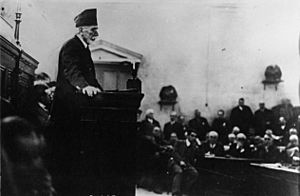
The Speaker of the Parliament leads the meetings and represents parliament to other countries. If the President of Greece is away or cannot do their job, the Speaker temporarily takes over as president. To elect a Speaker, more than half of all MPs must vote for them. If no one gets enough votes, another vote is held, and the person with the most votes wins.
Deputy Speakers help the Speaker manage parliament's work. They also represent parliament when the Speaker is not available. Deans and Secretaries help the Speaker with daily tasks and during meetings.
The Presidium
The Presidium is a group that includes the Speaker, seven Deputy Speakers, three Deans, and six Secretaries. This group makes sure that parliament's rules are followed. They also manage parliament's budget, services, and staff. A member of the Presidium cannot also be a government minister. The Speaker and Deputy Speakers are elected for the whole four-year term. Deans and Secretaries are elected for one year at a time.
The Presidium is made up of members from different political parties. This ensures that different viewpoints are included in running the parliament.
The Conference of Presidents
This group decides what topics parliament will discuss each week. They also set the rules and time limits for discussing new laws. The Conference of Presidents includes the Speaker, former Speakers (if they are still MPs), all Deputy Speakers, and the leaders of the main committees and parliamentary groups.
Since 2001, this group also helps choose the leaders of important independent organizations. These organizations make sure things like fair elections and privacy are protected.
Helping Parliament with Research
The Scientific Council and Scientific Service help MPs understand complex issues. They review proposed laws and provide research. This helps MPs make informed decisions. The Council has ten members, mostly university professors.
How Laws Are Made
Proposing New Laws
Both the government and individual MPs can suggest new laws.
- Government suggestions are called draft laws. They must include a report on how the law will affect the country's budget.
- Suggestions from MPs are called law proposals. These cannot be about giving special benefits to certain people, like raising their salaries.
All proposed laws must come with an explanation of their purpose. They also need a report on how they might affect people and a summary of public opinions. Finally, parliament's own scientific experts review all proposed laws.
The Regular Way to Make a Law
Most new laws go through a few steps:
- First, a special committee examines the bill and suggests changes. This happens in two stages, usually a week apart.
- If the committee approves the bill, it goes to the full parliament (the plenum) for debate.
- In the plenum, MPs vote on the bill in three stages:
- First, they vote on the main idea of the bill.
- Then, they vote on each part (article) of the bill. MPs can suggest changes here.
- Finally, they vote on the entire bill as a whole.
Making Laws Quickly (Urgent Procedure)
Sometimes, the government needs a law to be passed very quickly. They can ask parliament to treat a bill as "very urgent." If parliament agrees, the bill is discussed and voted on in a single, shorter meeting. Only a limited number of MPs can speak during these urgent debates. This procedure is used for about 1 in 10 laws passed since 2012.
How Parliament Votes on Laws
Usually, a law passes if more than half of the MPs present vote for it. At least 75 MPs must be present for a vote to count. However, for very important laws, like changing the electoral system, more MPs must agree. For example, changing the electoral law needs at least 200 MPs to vote yes.
MPs usually vote by saying "yes," "no," or "present." If at least 15 MPs ask for it, a special "roll call vote" can happen. In this case, each MP's vote is recorded. For a bill to pass with a roll call vote, at least 120 MPs must vote in favor.
Making Laws Official
Once a bill is passed by parliament, it is sent to the President of Greece. The President then officially announces the law and publishes it in the Government Gazette. This makes the law official for everyone. Since 2010, all laws are available for free online.
Checking on the Government
Parliament also has ways to check what the government is doing. This is called parliamentary control. MPs can ask questions, make requests, and start investigations. These checks happen at least twice a week.
Ways Parliament Checks the Government
- Petitions: Citizens can write to parliament with complaints or requests. MPs can support these petitions. A government minister must reply within 25 days to a petition supported by an MP.
- Written Questions: MPs can ask ministers written questions about important public matters. Ministers must reply in writing within 25 days.
- Motions of Confidence: When a new government is formed, the Prime Minister must ask parliament for a "vote of confidence." This shows that parliament supports the new government. Parliament can also vote to remove its trust from the government if it's not doing a good job.
- Investigation Committees: Parliament can set up special committees of MPs to investigate important public issues. These committees have strong powers to gather information. They write a report on what they find.
Parliament's Special Groups (Committees)
Parliament does a lot of its work in smaller groups called committees. These groups help with making laws, checking the government, and looking into special topics. The types of committees include:
Standing Committees
These committees are set up at the start of each year. They examine and discuss new laws. They also check on the government's work and give opinions on important public appointments. For example, they are informed before the government signs big contracts worth over 20 million Euros.
There are six main standing committees:
- Cultural and Educational Affairs
- National Defense and Foreign Affairs
- Economic Affairs
- Social Affairs
- Public Administration, Public Order, and Justice
- Production and Trade
Special Standing Committees
There are four other special standing committees. They work like the regular standing committees but focus on specific areas:
- Financial reports and the state budget
- European affairs
- Monitoring the social security system
- Armament programs and contracts
Special Committees
These committees are created for specific bills or law proposals. They work until they finish discussing those particular laws.
Special Permanent Committees
These committees are set up for the entire four-year parliamentary term. They focus on important ongoing topics. For example, there's a committee on institutions and transparency, one for Greeks living abroad, and one for environmental protection. There are also subcommittees for specific issues like water resources or people with disabilities.
Committees for Parliament's Own Work
These committees manage how parliament itself operates. They deal with rules, finances, and the parliament's library.
Checking Public Organizations
This committee checks the leaders of public companies, banks, and social security agencies. They give opinions on whether these leaders are suitable for their jobs.
Committees on Big National Issues
Parliament can create committees to study very important national issues. These committees research the topics and then present their findings.
Investigation Committees
These committees investigate matters of public interest. They are formed if at least 60 MPs propose it and at least 120 MPs vote for it. If the issue is about foreign affairs or national defense, 151 MPs must vote for it. These committees have the same powers as investigators and public prosecutors.
Checking Money and Assets
This committee checks the money of political parties and election candidates. It also checks the wealth of the Prime Minister, party leaders, ministers, and MPs. This helps make sure everyone is honest about their money and that new wealth comes from legal sources.
Changing the Constitution Committee
This committee examines proposals to change the constitution. At least 50 MPs must suggest a change for this committee to review it.
Special Ways to Make Decisions
Changing the Constitution
Parliament has the power to change or update the constitution. However, some parts cannot be changed. These include the articles that say Greece is a parliamentary republic and those that protect basic human rights and freedoms.
To start changing the constitution, at least 50 MPs must propose it. Then, three-fifths (180) of all MPs must agree in two separate votes. The next parliament then makes the final decision on which parts to change. A parliament that has the power to change the constitution is called a "revisional parliament."
Since 1975, Greece's constitution has been updated four times: in 1986, 2001, 2008, and 2019. After a change is made, at least five years must pass before another revision can begin.
Electing the President
The President of Greece is chosen by the parliament for a five-year term. The election involves several rounds of voting.
- In the first round, a candidate needs two-thirds (200) of all MPs' votes.
- If no one wins, a second vote happens five days later.
- If still no winner, a third vote happens five days after that. This time, a candidate needs three-fifths (180) of the votes.
- If the third vote fails, parliament must hold new elections for MPs. The new parliament then tries to elect a president. They first try for three-fifths majority. If that fails, they try for an absolute majority (151 votes). If that also fails, the person with the most votes wins.
Other Activities of Parliament
Parliament TV
Parliament has its own TV channel, Vouli TV. It shows all the meetings of the full parliament and its committees. When there are no meetings, the channel broadcasts movies, plays, classical music, and historical documentaries.
Junior Parliament
During the summer, parliament runs a "junior parliament" program. High school students from Greece, Cyprus, and Greek communities around the world come to parliament. They give speeches and have debates, just like real MPs. This program helps young people learn about public life and lets MPs hear ideas from younger generations. Parliament also offers tours for schools throughout the year.
Parliament often holds exhibitions about Greek political and parliamentary history. It also runs the Parliament Foundation, which researches and publishes materials about parliament's history and functions.
Where Parliament Meets
The first place the Greek Parliament met was in a house in central Athens in 1843. After a fire, a new building was constructed, which is now called the Old Parliament House. Parliament met there from 1875 to 1932.
The building where parliament meets today is the Old Royal Palace. It was designed by Friedrich von Gärtner and finished in 1843. It was originally a palace for the Greek kings. After a fire in 1909, it was renovated. The royal family moved out, and after Greece became a republic in 1924, the building was used for different things. In 1929, it was decided that it would become the permanent home of parliament. It has housed parliament ever since 1934.
In front of the building is the Tomb of the Unknown Soldier. This monument honors soldiers who died for Greece. It is guarded day and night by special soldiers called Evzones.
The main meeting room of parliament is on the ground floor. It is shaped like an amphitheater, with seats arranged in a curve. The Speaker's chair and the places for ministers are at the front. A balcony above the seats is for visitors. A special roof lets in natural light.
There is another, smaller meeting room on the second floor. It was once used by the Senate, but since Greece no longer has a Senate, it is now used for party meetings and other events.
The parliament building has two main entrances: a formal one facing the Tomb of the Unknown Soldier and a business entrance facing the National Gardens. The building is always being improved, for example, with a large underground parking garage. However, parliament's needs have grown so much that some offices have moved to nearby buildings.
See also
 In Spanish: Consejo de los Helenos para niños
In Spanish: Consejo de los Helenos para niños


